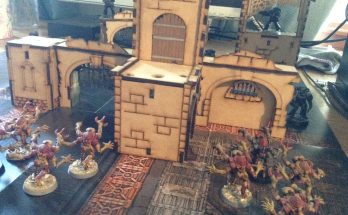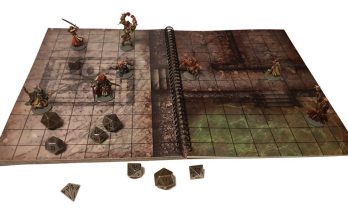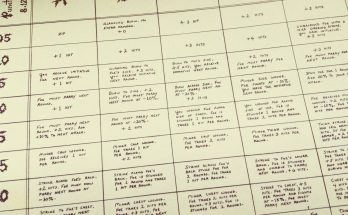There’s a chain of thought in D&D which suggests that each class should be associated in some way with one of the six attributes. Fighter, for example, is keyed to STR, Rogue = DEX, Barbarian = CON, Wizard = INT, Cleric = WIS and Bard = CHA.
There’s a compelling synergy there; six classes, six attributes, with each class playing to the strengths (no pun intended) of whichever attribute is “theirs”.
It makes solid sense too – after all, Fighters (generally) have a high Strength stat, and it’s a rare Wizard indeed who has an INT of less than 16. Yes, it’s gamist, but at the same time there’s a certain elegant simplicity about it which is hard to ignore. Rogues need high Dexterity to perform their Roguely duties, and a Bard with low Charisma won’t be a Bard for very long.
There is a role-playing backstory rationale for this too. A particularly Intelligent character will likely be noticed as potential Apprentice material by the local Wizards’ Guild, and those showing Wisdom will most likely be enrolled into the Priesthood. It’s also likely that it’s the very training the characters receive before they begin play at Level One make their attributes what they are. Your Fighter has high Strength because he practiced daily with his Sword and Shield, while the Barbarian’s Constitution is so good because there’s no McDonalds Drive-Thru in the untamed wilds.
Earlier Editions of D&D recognized the synergy between Attributes and Classes by giving an XP bonus for having a high Prime Requisite stat. It didn’t make a lot of sense to me – after all, a low Strength Fighter would have to work harder to defeat the Orcs, so to my mind should get more XP than the high STR Fighter for doing the same work. I’m glad that XP bonuses for attributes are a thing of the past (unless you’re still happily playing an earlier edition (or a retro-clone), of course, and more power to you if you are), and hope they do not return.
Surely a clever Fighter who uses his wits (high INT) is just as viable as a high Strength one, and should be rewarded as such by gaining the same or similar in-game benefits? A Fighter with INT 16 is more likely to know where to hit (possibly through studying anatomical texts), whereas a WIS 16 one will use dirty tricks and clever foils to achieve the same goal. Likewise rationales can be made for an agile (DEX), unstoppable (CON) or showy (CHA) Fighter, and those are just a few adjectival examples.
The point (and there is one, I’m sure) is that there is a whole vista of potential to be found in the synergies between all the attributes and the classes. Not all Clerics should be wise, but could be known for their Strength at arms, scholarly Intelligence or Charismatic sermons. Likewise, there’s a lot of mileage to be found playing a thuggish Strong-but-low-Dex Rogue or a zenlike con-artist Rogue with a Wisdom in the high teens. If anything, the Rogue class has seen more progression toward this line of thinking with an increasing number of Rogue options being geared toward playing the smooth-talking Charismatic Rogue rather than the traditional Rogue/Dex synergy.
I could list others examples – the low Intelligence, high Charisma showman Wizard, the high Dex swashbuckling Fighter, etc – but that’s the point. There’s nothing to stop you creating such a character right now, but the game should provide solid rules that actively make these viable game options rather than being sub-optimal characters. This opens up a range of different play-styles and that’s a Good Thing, right?
What to you think? Should the traditional tropes of Strong Fighters, Intelligent Wizards, Wise Clerics and the rest be just presented as merely one of a whole range of options (and possibly the de facto easy-to-play default)? Should the game mechanics support and encourage playing against the stereotypes in some way?
Over to you, dear reader.




I agree with you that there are too many (more interesting) roleplaying characters to be found in alternately attributed classes. Notice the biggest flaw with this system is that it leaves out Ranger! Even if you prefer a more martial (magic-less) Ranger to be made with Fighter, you would still place your highest stat in Dex, not Str.
Not directly related to classes, but still about attributes, I have even questioned the attributes connected to skills. Some skills are obvious, but others could be open to other attributes. For example, in Mongoose’s Conan, an alternate Intimidate skill was introduced. What if your intimidation is because you are a bully (Str), overawe your opponent with your agility (Dex), or frighten your opponent when you respond to their best shot with “Is that the best you can do?” (Con)? Of course, that can be handled with home rules.
Of course, the #1 rule of the game is to have fun. If you have the most fun when your Fighter has max Str and min Cha, then you should play it that way and have fun.
Yeah. Some classes – Ranger and Paladin, and the Druid to a lesser extent – act like hybrids of two classes and need two attributes at a decent level to work optimally. The Ranger falls somewhere between the Fighter and Rogue for the attribute requirements and the Paladin between the Fighter and the Cleric (with a nod to Charisma too, depending on edition).
Certainly skills should be separated from attributes as well, and I really like the direction D&D Next is heading in that regard.
Thanks for your feedback!
In the early D&D where primary ability scores affect earned experience, there was also a rule about secondary abilities. For example, a Fighter’s Strength is considered to be 1 point higher for every 2 points of Intelligence. This was later (in Holmes) interpreted as a way to shift points from one score to another, but originally there was no point trading.
I guess what you’re describing could be considered different classes. If you think of a “Fighter” as a class that uses their strength in combat, a character that used wiles or dexterity would then not be fighters, but something else. Maybe a martial artist? Swashbucker?
This, of course, breaks down if you think of a fighter in more broad terms as “someone who fights” in some undefined way. If you look at a class in this way, it certainly makes sense to incorporate the capacity to fight in different ways.
There are benefits either way, IMO. In the first way, if you want to use strength to do stuff, take fighter. Dexterity, rogue, and so on. This doesn’t work if you tie the class to what they do. My character that enters combat with something closer to the skill side of things than the brute strength side of things who doesn’t steal things or sneak doesn’t fit as a character class that’s been bundled with those particular skills.
The other way, if you want to fight, take Fighter, steal and sneak, rogue. This kind of fits better, but still has flaws. A Smash-and-grab rogue is not well suited to being saddled with wall climbing skills, for example. They benefit him in no way, and he even suffers an opportunity cost if you’re in a 3E type system where he then has a more narrow skill selection that he would otherwise enjoy.
Honestly, I really prefer things to be classless. Skills and attributes are all you need. Want to fight, take fighting skills. Want to use brute force, take Str… want to use wits instead? Charisma or int or something. Why force the issue with increasingly narrowly defined classes at every turn?
For introducing players, I don’t think you can fault the simplicity of ‘ fighters fight, rogues sneak, etc. if you want to be a fighter, make strength your highest stat, if you want to be a rogue, make dex your highest, etc.’ Complicated ‘my fighter is based on CHA and feints a lot in combat can be left to players that really want to mess with the numbers.
Usually, that’s only a way to get some mechanical bonus anyway; base your fighter off CHA and you have a fighter that can fight as well as any other fighter but can negotiate better than any standard fighter. Same goes for dex; why build a fighter on strength at all when your mate builds his fighter on dex and gets improved stealth, initiative, etc as part of the deal. If your DEX fighter fights as well as a STR fighter, what are you losing? If the answer is nothing, you are immediately unbalanced compared with a STR fighter. I am not a great believer when the player claims his build is supported by his unusual back story and it is a coincidence that he just happens to be a better fighter than the standard fighter and a better rogue than the party rogue and a better negotiator than the party bard. Conan started his urban career as a thief but that is what he did to earn money, his ‘class’ was still fighter.
Less variance in rules doesn’t make for worse characters, in my opinion, it makes for less mechanically different characters (it is true) and more characters with variant backgrounds.
That’s a really good point. I thought Iron Heroes did a nice job of interpreting classes as “fighting style.”
One of the Rolemaster Companions gave an option for level-less. You took however many XP were needed for the next level and divided that by the number of Development Points you would earn at that level. Whenever you earned that amount of XP, you gained another Development Point to spend on your character.
Pendragon RPG (Basic/Chaosium) gave you checks whenever you criticaled a skill roll. Those were the skills you could improve at the end of the year.
I seem to recall that originally, D&D 3rd edition required you to have a good excuse for multi-classing. Conan is a good example. He started as a Barbarian. As he moved south, he spent time as a Thief. Later, he worked as a soldier. If you wanted to go from Ranger to Rogue at your next level, you needed to spend some time thieving or focusing on stealth.
Combining these ideas, could make a good system, I think. Granted, most D&D characters do spend most of their time fighting, but I never thought it made sense that the High Priest who never left the Temple had a +10 base attack bonus. (Maybe it worked liked the Karate Kid’s wax on/off and all that kneeling, standing, and crossing during leading the Mass somehow gave him great moves in a fight?) But if you could only improve the skills you used during the last level, I think your character would make more sense.
The game should always encourage and support different styles of playing the class, as you suggest.
In the days before point buy, ‘playing against type’ wasn’t something you did because you were clever. It was something you did because those are the stats you rolled up for your character and you didn’t have much of a choice. Even now the game still has paths of least resistance to the type of character you’re going to play. Before if you wanted to fight then you needed strength. Now if you want to make a dex based fighter in pathfinder there is a good chance you’re going to have a scimitar because that’s how you add your dex to damage.